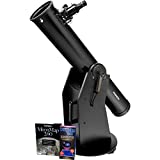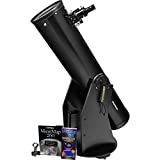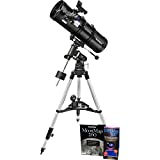Orion telescopes – Buying guide & Comparison
Finding a good Orion telescope is never easy, especially if you’re new to the field of stargazing. You don’t have to be an astronomer to admire planets and stars, but knowing a thing or two about telescopes can definitely help you choose a model that’s easy enough to use as well as with a decent image quality and magnification power. There are many Orion models on the market that make for a good buy, but if you truly want the best for the price, then the Orion SkyQuest XT6 is definitely it. With a 1200mm focal length and 6-inch aperture, you get a great telescope to start your astronomical journey without paying a huge price. Controls are fairly easy to use, and you also get special software to help you map out the night sky. However, since good things often get sold out quite fast, you may also want to look at Orion SkyQuest XT8 the in case the first becomes unavailable.
Comparison table
 Our Top Choice
Our Top Choice
The 6-inch aperture is one of the biggest advantages offered by this particular model. Being able to gather more light from the environment, it will also manage to provide you with bright images for easy observation of details. The focal length is on par with the size of the aperture, and you will be able to reach further in your explorations of the celestial bodies in the night sky.
Instructions seem to be flimsy and not entirely accurate.
An optimal choice if you are looking for superior performance at a decent price.
 2nd Best
2nd Best
Observing the celestial bodies of your choice in high detail is possible, due to the 8-inch aperture that is superior to many units on the market. The Crayford focuser is another important benefit of this model that ensures that you get the crispest images on your unit, for further observation of details. Examining cosmic events is easy with the help of the 25mm eyepiece provided.
This unit is a bit heavy, so you should expect that when traveling.
A great option for observing the planets in our solar system in high detail, and not only.
Also To Consider
The optical tube on this model has 24 inches, which means that it is compact enough to be packed and used when traveling. The equatorial mount is an excellent add-on, and so is the included tripod that will allow you to track the movement of celestial objects with great ease. Many accessories are included, among which we should mention the two eyepieces and the handy software.
Some buyers say that the instructions are pretty terrible.
If you want a portable model, this one is for you, as it fits in a backpack with ease.
Before you get to read the actual reviews, we thought that you might want to get accustomed to some common technical terms and components of telescopes first. This is why we have written a short buyer’s guide, to walk you through the basics of telescopes as well as to give advice on which features should you be looking at most to suit your needs, preferences, and level.
A few telescope basics
Before delving into the technical info of each telescope, you’d best become familiar with the main components. A telescope has a main optical element which is either a mirror or a lens. Its diameter is called an aperture which dictates the amount of light the telescope it can gather, and the brightness and amount of details (resolution).
A telescope also has a focal length, which is the distance between the main optical component, or point of light entry, and the focal plane. Any telescope will come with one or more eyepieces, which also have their very own focal length. Divide the focal length of the telescope to that of the eyepieces, and you find out how much a telescope can magnify distant objects. For a 1000mm (39.37in) lens, you get 40 magnification with a 25mm eyepiece and 100x with a 10mm eyepiece.
Complexity vs. ease of use
While you may want to get a telescope with the largest aperture possible, remember that these devices can get fairly sophisticated and difficult to use if you don’t know much about them. Especially if you’re just starting out, it’s a good idea to start with a simpler (and also cheaper) model to learn the ropes of astronomy, and only go for the more complex models after you’ve mastered the former.
A few convenience considerations
Just as they say with many other things in this world, the best telescope is the one you’ll use the most. If you want a high-quality telescope, then you can rest assured that it will be large, heavy and complex. This means that it would probably spend most of its time in your backyard or even your basement, as hauling a 50-pound telescope is no easy task, and would probably take the help of a few buddies, let alone require an hour to set up and one more hour to take it down.
So if you value mobility, you probably want a light, compact and portable telescope. It may not provide you with the highest quality imagery, but you’ll be able to use it often. On the other hand, you surely can get super-quality, but you need to have a way to transport it and know how to install it on site and calibrate it properly.
5 Best Orion Telescopes (Reviews) in 2024
If you’re looking for the best Orion telescope but haven’t been able to decide on a model just yet, then you’re in luck, as we have compiled this list of top 5 telescopes especially for you. Here are the main products that should command your attention, with full descriptions and features you should be looking at in order to make the best purchase possible.
Contents
1. Orion 08944e 48x BLACK Reflector Telescopes

The long 1200mm focal length is great for both lunar observations as well as the study of distant celestial objects. The resulting focal ratio of the telescope is f/8, resulting in a wide and crisp view of the cosmos.
This large telescope lens is attached to its Dobsonian base through the latest CorrecTension Friction optimization system which benefits from heavy-duty springs, ensuring a secure and balanced platform.
Thanks to the 1.25in or 25mm Sirius Plossl eyepiece, you get to enjoy a 48 x magnification providing a 52-degree field of view. You also get to learn more about the universe with the free Starry Night Special Edition software.
Pros
It is one of the most popular beginner Dobsonian reflector telescopes you can buy and it has a wide 6” aperture that lets enough light in to allow for gorgeous and clear views of the night’s sky.
The Dobsonian mount has garnered a lot of positive reviews from customers saying that it provides a very stable and vibration-free viewing platform.
Tracking celestial objects is also extremely easy, so much so that the entire family can join in the fun and use the telescope to observe deep-sky objects such as nebulas and galaxies.
You get a comprehensive selection of accessories with this product including a collimation cap, a 25mm Plossl eyepiece, the 2” Crayford focuser, and the EZ Finder II reflex sight.
Cons
Despite it being an entry-level telescope, don’t expect to take it with you when camping since customers have reported it is very heavy which makes it uncomfortable to carry.
Buy from Amazon.com
2. Orion 08945e Black 29x Reflector Telescope

With a 1200mm focal length, this telescope is perfect for both beginner and enthusiast astronomers, providing a wide field of view and a focal ratio of f/5.9.
Equipped with a 2-inch Crayford focuser, you can easily obtain sharp and crisp focus so that you get to enjoy the finest details with high contrast of planets in our solar systems as well as beyond it.
With the 25mm Sirius Plossl eyepiece, you get to explore the universe and see larger details thanks to the 48x magnification, while the wide view will give you a better perspective on cosmic events.
The package also comes with the comprehensive Starry Night astronomy software, which contains info on celestial bodies as well as sky simulations.
Pros
It can be pitched and rotated easily and that will provide the users with a more versatile and varied way of observing the night sky.
With the SkyQuest XT8, you get a lot of value for your money once you consider the high-quality optics and the wide variety of celestial objects you will get to observe.
It is a versatile product that is suitable for all types of stargazers, beginners, amateurs, or professionals since it can quickly accommodate your skill and knowledge.
Its family-friendly design will allow children to enjoy this fascinating hobby since the easy-to-use finder and optical tube make exploring the night’s sky seem like child’s play.
It is very easy to assemble even if you’ve never owned a telescope before.
Cons
The basic package does not come with all the accessories needed to take full advantage of the telescope, which might mean you will need to purchase extra lenses or filters.
Buy from Amazon.com
3. Orion 09007 SpaceProbe 130ST Equatorial Reflector Telescope

With a 5.1″ aperture and a 24-inch optical tube, this is a compact telescope that will provide you with imagery with lots of details of the planets in our solar system as well as objects far beyond it.
This telescope comes with a solid EQ-2 equatorial telescope mount and a stable tripod which will allow you to slow-track objects without being bothered by Earth’s revolution around its axis. You also get more stability and accuracy in tracking while also enjoying a compact model you can fit into a larger backpack and take with you on both short treks and long journeys.
The SpaceProbe 130ST comes with 2 eyepieces, 6 finder scopes as well as a collimation cap, pinion focuser, special edition Astronomy software and other accessories to get you started with your new passion.
Pros
It features a signature 24-inch optical tube rather than the more standard 33-inch variant and the shorter size makes this option easier to carry or store and it can fit into smaller vehicles.
It does not compromise when it comes to the quality of the optics since the 5.1-inch aperture has enough light-gathering ability to satisfy the curiosity of any amateur stargazer.
While you can purchase additional accessories if you wish to get more out of your telescope, the included items are more than sufficient to provide an enjoyable viewing experience.
The product also includes a free copy of the Special Edition of Starry Night astronomy software with realistic simulations of the sky and many other useful features.
Cons
Because it is a compact telescope designed for beginners, it does not offer the wider aperture or the fancy features of the more expensive and larger telescopes.
Buy from Amazon.com
4. Orion 9024 AstroView 90mm Equatorial Refractor Telescope

Not only does it sell for a modest amount of money compared to its more sophisticated counterparts, but it also provides good quality and plenty of nice features for its price.
With a 90mm (3.5 inches) aperture and 910-mm focal length, you get a good focal ratio of f/10 and a telescope you can count on to provide you with great views filled with details of Jupiter’s cloud bands and its moons, the rings of Saturn and even its large moon Titan under a clear night sky.
This telescope comes with a 25mm Plossl eyepiece which provides 36x magnification as well as a 10mm eyepiece with an incredible 91x magnification power, which should render a great view of both close and distant celestial objects.
Pros
It is a solid piece of optical engineering that features an equatorial mount and a tall and stable tripod to give you an unmatched view of the night’s sky.
You won’t need to set aside an extra budget for future upgrades since this model is already accompanied by a large array of accessories.
If you are an amateur astronomer, the included Starry Night astronomy software package can teach you everything you ought to know about this hobby and how to best use the instrument.
Many refractor telescopes in this price range can’t provide a decent view of objects further than the Moon, yet this option can pack quite a punch when it comes to distance.
The classic refractor design offers a big plus since when not in use – the instrument can be used as part of your decor.
Cons
Customers have reported that there is a bit of delay when focusing onto a target and while it lasts only a few seconds it can feel frustrating.
Buy from Amazon.com
5. Orion 10012 SkyScanner 100mm TableTop Reflector Telescope

This telescope doesn’t come with the plastic lenses you’d expect for the price, but with quality fully-coated parabolic glass mirrors.
Equipped with a 3.93in aperture and a focal length of 400mm or 15.74in, this telescope is sure to provide people new to the field of astronomy with a great study tool.
You don’t just have the Moon at your disposal to study its craters, small mountains, and valleys, but also distant planets in our solar system as well as far-away nebulae, star clusters and much more.
You get 2 eyepieces of 20mm and 10mm to enjoy magnification powers of 20x and 40x respectively to open up a new cosmos that is usually hidden to the naked eye.
Pros
This compact Newtonian reflector telescope has an aperture of 100mm and it is one of the cheapest you can find right now without sacrificing the key features of a good telescope.
It is small and light which means that it is the perfect option for stargazers who like to travel a lot and want to grab their optical instruments with them.
Thanks to the tabletop design you won’t need to purchase voluminous and expensive tripods and when not in use, you can display the telescope on your desk.
The telescope is powerful enough to let you see outer planets, galaxies, star clusters and take breathtaking shots of our moon.
It includes the Orion EZ Finder II red-dot type finder which is very easy to mount and the metal mounting studs and nuts will guarantee a strong mount and long life.
Cons
The focuser can appear to be stiff during the first few uses but it loosens up the more you use it.
Buy from Amazon.com










